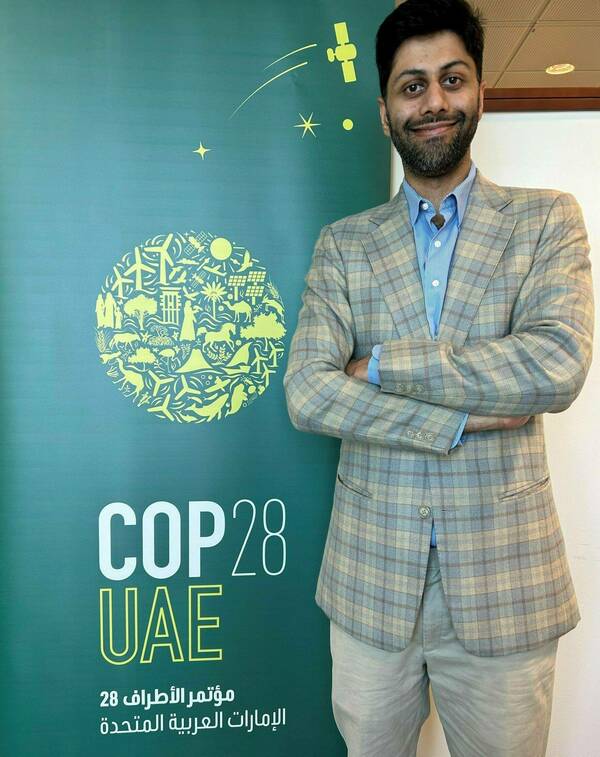Former ND-GAIN Research Associate brings food systems into focus at UN climate summit
Later this month, more than 70,000 participants will attend the UN climate summit in Dubai. In the months leading up to the summit, known as COP28, Mohammed Farrae, a Master of Global Affairs graduate (2022) from the Keough School of Global Affairs and former ND-GAIN Research Associate, has been preparing to convene key groups that will showcase climate-smart strategies for agricultural food systems. This effort is critical because agriculture contributes to climate change while simultaneously being hurt by its effects.
“Some 10 billion people will live on our planet by 2050, and collectively we must figure out a way to feed them while also protecting and restoring our ecosystems,” said Farrae, a food systems and climate specialist for COP28. “We’re bringing climate and agricultural experts into the conversation so we can reduce emissions without compromising food security and small-scale producers’ livelihoods.”
Based in Abu Dhabi, Farrae has been working to mobilize both climate and agriculture-focused organizations for a series of side events that will take place adjacent to the UN summit. Participating partners range from global research centers to financial institutions to government officials to civil society groups, and include representatives from the World Bank, the Food and Land Use Coalition; the World Resources Institute, a global research nonprofit; and CGIAR, a global research partnership dedicated to transforming food, land, and water systems. Session topics will include regenerative agricultural practices, methane emission reduction, the role of cities in food systems, malnutrition, and food waste reduction.
“The pace of innovation that we’re seeing across both sectors is encouraging, and we’re trying to maximize these events to create as much momentum as possible towards innovations with the greatest promise of scaling,” Farrae said.

Farrae joined COP28 in May after hearing about the open position from Paul Winters, Keough-Hesburgh Professor of Global Affairs. Farrae had enjoyed serving as a student research assistant for Winters, a food systems expert who serves as executive director of the Innovation Commission for Climate Change, Food Security, and Agriculture.
“Having access to Paul’s expertise, mentoring, and professional network have been transformational for me, as a student, as a research associate and now as a professional,” Farrae said.
On a personal note, Farrae also said that COP28’s location has enabled him and his spouse, Hafsa Sheikh— also a master of global affairs graduate—to live closer to their home country of Pakistan.
Farrae came to the Keough School with an academic background in mechanical engineering and experience leading a Bill and Melinda Gates Foundation-funded project focused on childhood environmental education through interactive projects focused on bee and bird rehabilitation in Pakistan. He became interested in rural food systems while working with Winters, and gained valuable research and project management skills while participating in the Keough School’s Integration Lab, (i-Lab).
“I learned how to organize a project that isn’t well-defined at the beginning, how to work closely with external and internal partners, and also learned how to use different communication styles as tools.” Farrae said. “I now use all of these skills and also am able to incorporate the multicultural perspectives of my classmates, who came to Notre Dame from around the world.”
While he’s still new to the food systems sector, Farrae is learning on the go while planning for the high-stakes international climate summit.
“It’s been challenging to develop a depth of knowledge quickly, as I’m fairly young in the food space compared to my colleagues,” Farrae said. “But the Keough School has prepared me well, and I am up for the challenge.”
Originally published by at gain.nd.edu on November 21, 2023.
Latest Research
- University of Notre Dame and IBM Research build tools for AI governanceMain Building (Photo by Matt Cashore/University of Notre Dame) …
- Smarter tools for policymakers: Notre Dame researchers target urban carbon emissions, building by buildingCarbon emissions continue to increase at record levels, fueling climate instability and worsening air quality conditions for billions in cities worldwide. Yet despite global commitments to carbon neutrality, urban policymakers still struggle to implement effective mitigation strategies at the city scale. Now, researchers at Notre Dame’s School of Architecture, the College of Engineering and the Lucy Family Institute for Data & Society are working to reduce carbon emissions through advanced simulations and a novel artificial intelligence-driven tool, EcoSphere.
- Seven engineering faculty named collegiate professorsSeven faculty members in the Notre Dame College of Engineering have been named collegiate professors—a prestigious title awarded by the university and college in recognition of excellence in research, teaching and service. The designation may be conferred on faculty at the assistant, associate or…
- ‘A special challenge’: German studies scholar wins National Humanities Center fellowship for research on medieval womenFor CJ Jones, the joy of research is not the answers but the journey. And the next step on that journey is a fellowship with the National Humanities Center. …
- Notre Dame Lead Innovation Team partners with local WIC program to identify, prevent lead poisoning in childrenB.A.B.E. store “shoppers” now have something new to help their families: free lead screening kits offered by the University of Notre Dame’s Lead Innovation Team.
- Notre Dame Welcomes Ninth Cohort of Warrior-Scholars for Transformative Academic JourneyNOTRE DAME, IN – The University of Notre Dame recently concluded its ninth successful Warrior-Scholar Project (WSP) boot camp, hosting 34 dedicated Warrior-Scholars from June 21st to 28th. This intensive, week-long academic residency provided transitioning service members and veterans…













